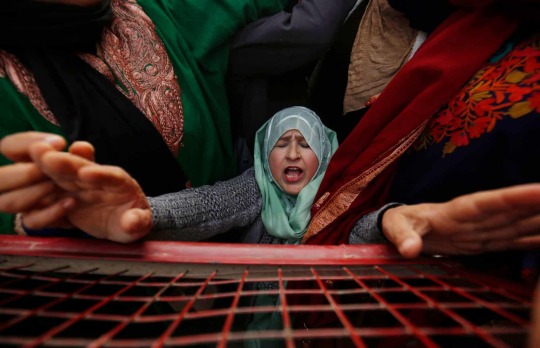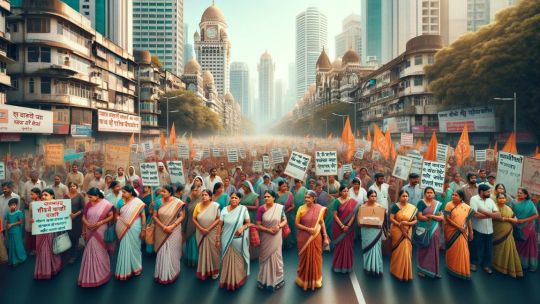#anganwadi scheme
Photo

Srinagar, Indian Kashmir
A female worker of the social welfare department, working under the Anganwadi scheme, shouts slogans during a protest. Dozens of Anganwadi workers and helpers protested against the newly approved human resource (HR) policy framed by the government
Photograph: Farooq Khan/EPA
#farooq khan#photographer#epa#srinagar#indian kashmir#culture#anganwadi scheme#protests#social welfare department
0 notes
Quote
The top-down approach in the system adds to the problem. Giving a toolbox of policy interventions with requisite autonomy to the local government is a way to go forward. Adequate training of our existing healthcare workforce in nutrition is pertinent and will lead to better health outcomes. Unification of all malnutrition schemes into a single Ministry of Nutrition will help in consolidation of efforts and resources. The ministry should be made responsible for all nutrition-related interventions ranging from Anganwadi services scheme, mid-day meals to ration distribution. The establishment of a nutrition cadre at the village level to reduce the burden of nutrition interventions on overworked Anganwadi workers is an essential step.
‘Is India’s Economic Growth Hiding its Hunger Crisis?’, News18
#News18#India#top-down approach#policy interventions#autonomy#training#healthcare workforce#nutrition#malnutrition schemes#Ministry of Nutrition#Anganwadi services#Anganwadi workers#ration distribution#nutrition cadre
2 notes
·
View notes
Text
Jamshedpur DM Reviews Progress of CM Maiyan Samman Yojana
Officials directed to expedite application process and ensure efficient implementation
District Magistrate Ananya Mittal assessed the Jharkhand Chief Minister Maiyan Samman Yojana’s progress via video conference.
JAMSHEDPUR – District Magistrate Ananya Mittal held a video conference to review the implementation of the Jharkhand Chief Minister Maiyan Samman Yojana, issuing key directives to…
#Anganwadi Sevikas role#जनजीवन#DRDA Jamshedpur#Jamshedpur District Magistrate Ananya Mittal#Jamshedpur municipal administration#Jamshedpur social welfare#Jharkhand Chief Minister Maiyan Samman Yojana#Jharkhand government initiatives#Life#pension approval process#pension scheme implementation#Village Level Entrepreneurs
0 notes
Text
Anganwadi Hot Cooked Meal Scheme : नोएडा (चेतना मंच)। जनपद गौतमबुद्धनगर के नॉन कोलोकेटेड आंगनबाड़ी केंद्रों पर 3-6 साल के बच्चों को गर्म भोजन उपलब्ध कराने के उद्देश्य से आज डीएम मनीष कुमार वर्मा (DM Manish Kumar Verma) ने बिसरख ब्लॉक के आंगनबाड़ी केंद्र हरौला में हॉटकुक्ड फूड योजना का बच्चों को तहरी भोग परोसकर शुभारंभ किया।
0 notes
Text
"The data showed that in basic income villages the share of children with normal weight increased from 39 per cent in April 2011 (as recorded by the anganwadis) to 59 per cent in September 2012, an improvement of nearly 20 percentage points. That was twice as great as in the control villages,
But what was even more notable is that, while the nutritional status of boys improved, the absolute and relative improvements for girls were much greater. In the basic income villages, the share of girls with normal weight increased by over 25 percentage points, more than double that in the control villages. The share of boys attaining normal weight-for-age rose by 14 percentage points in the basic income villages, compared with only 9 percentage points in the control villages.
So, the basic income was associated with a stronger positive effect on the nutritional status of girls. This is consistent with findings in countries such as Mexico, where a CCT was found to have reduced stunting among girls by 39 per cent and among boys by 19 per cent (Aguero et al., 2007)."
p94
2 notes
·
View notes
Text
The Punjab government has allocated Rs. 46.89 crore for the honorarium of Anganwadi workers and helpers, reflecting its commitment to their welfare. This funding supports essential child and maternal health services under the ICDS scheme.
1 note
·
View note
Text
Fighting tropical disease
Context: The efforts of ASHA workers have brought revolutionary changes in the health services in rural areas and hence in the recent interim budget, it has been decided to include all ASHA workers Anganwadi workers and assistants in the healthcare cover under the ‘Ayushman Bharat’ scheme.
More information:
Ayushman Arogya Mandirs play a crucial role as primary healthcare centres, providing…

View On WordPress
0 notes
Text
Highlights of interim budget 2024

Digitally infos: Highlights
Introduction:-
There has been profound positive transformation in the Indian economy during last 10 years, said by Finance Minister Nirmala Sitharaman's.
Also, history is now been made as Finance Minister Nirmala Sitharaman's has announced the sixth consecutive budget in particular of which it is matching the record that is set by the former Prime Minister Morarji Desai. Now it is just ahead of the Parliamentary elections.
Also, President Droupadi Murmu addresses on various aspects of the economy, and highlighted the achievements during the period of 10 years that is done by the Narendra Modi government.
· There will be four castes for the government which includes poor, farmers, youth and women that she added.
· Because of budget, India is now becoming fastest growing major economy in the world. In the coming year India will become the world third largest economy along with $5 trillion GDP and this show how fast India is growing now.
· Finance Minister Nirmala Sitharaman’s Budget 2024 to Vote on Account and is planning to bring forth a way to that objective.
· By presenting the Budget 2024-25 in the parliament, she put across that the government is working on their planning to make India a developed country by the end of 2047, which is good for India.
Agenda:-
(1) Freed many people from multi-dimensional poverty:-
· With the announcement of interim budget 2024, we are proud to inform you that Modi Government is accomplishing the mission to freed people from multi-dimensional poverty.
· And so far they have freed 25 crore people from multi-dimensional poverty during the 10 years, said by Finance Minister Nirmala Sitharaman’s on Thursday.
· During the announcement of interim budget in Lok Shabha Finance Minister Nirmala Sitharaman’s said, “While in the process of early approach for tackling poverty we came with enlightment result in very modest outcome”.
· We even make sure that there is transparency and assurance when benefits are transferred to all eligible citizens, said by Finance Minister Nirmala Sitharaman’s.

(2) To make India a developed nation:-
· Although Government is still working to make India a developed nation in the year 2047, said by Finance Minister Nirmala Sitharaman’s.
· There have been periodically increased in Minimum support price(MSP) for 'annadata' (farmers), addressed by the Finance Minister Nirmala Sitharaman’s when she announces the Interim Budget 2024-25 in Lok Shabha.
· Also, she even affirmed that the Government and social justice is essential and beneficial model for the Indian economy, as a plan for making it a developed country.
· We always focus on the outcomes of the work that we have done during the year whether it is related to making India a developed country or freed people from multi-dimensional poverty and outgoings of the money does not affect the Government.
(3) Healthcare cover under Ayushman Bharat is expanding to ASHA workers:-
· Ayushman Bharat Pradhan Mantri-Jan Arogya Yojana (AB-PMJAY) was established in Ranchi, Jharkhand by the Honorable Prime Minister of India, Shri Narendra Modi. Furthermore, it was introduced on 23rd September 2018.
· Under Ayushman Bharat, Government has announced expanding of healthcare cover to all ASHA and anganwadi workers on Thursday. In addition, it is beneficial for all the workers as per accordance to healthcare cover.
· Ayushman Bharat Pradhan Mantri-Jan Arogya Yojana (AB-PMJAY) is the largest public financial support for health insurance scheme in the world. Moreover, scheme provides minimum coverage of Rs 5 lakh per family per year for secondary and tertiary care in hospitalized.

Date and time
Announcement of budget 2024 will be on February 1 at 11 am. Interim budget 2024 is set to be announced by the PM Modi Government. As this is the sixth budget of Finance Minister Nirmala Sitharaman's.
Conclusion
Budget 2024 determined to make India a developed country, put an end to multi-dimensional poverty, and play the part in India to become the third largest economy in the world. Additionally, it contributes to Ayushman Bharat Pradhan Mantri-Jan Arogya Yojana (AB-PMJAY).
#budget 2024#budget 2024 dates#budget 2024 highlights#budget 2024 india#budget 2024-25#interim budget 2024#interim budget in india#interim budget meaning#union budget#Union budget 2024-25
0 notes
Text
N. Chandrababu Naidu’s Comprehensive Agenda For Human Resource Development

The holistic development of a society is contingent upon the comprehensive growth of its human resources. Recognizing this, Shri.Nara Chandrababu Naidu, the former Chief Minister of Andhra Pradesh, placed paramount importance on human resource development during his tenure. The Telugu Desam Party (TDP), under his leadership, made significant TDP contributions towards building a scientific, healthy, and ideal society in the state. Addressing the evolving needs of society, the TDP government focused on the trio of physical health, mental well-being, and education. From nurturing babies in the mother's womb to caring for the elderly, the government took a lifecycle approach to healthcare. The establishment of Anganwadis for children under five years old exemplifies their commitment to early childhood development, encompassing aspects such as literacy, nutrition, and play.
The TDP government, under the guidance of Shri.Nara Chandrababu Naidu, also prioritised the development of educational institutions. This encompassed schools, colleges, vocational and technical colleges, and international universities. The TDP agenda was not only to increase the number of educational institutions but also to bring education to the forefront, with a special emphasis on adult education alongside traditional methods. In recognition of the growing significance of computer knowledge and information technology in today's world, the TDP government initiated TDP policies and TDP schemes to provide computer education to every village and town in Andhra Pradesh. The emphasis on computer literacy was seen as a crucial step to prevent individuals from being left behind in an increasingly tech-driven world. A major highlight of the TDP government's contributions was its dedication to sports and physical activities. Understanding that sports are not merely for entertainment but essential for cultivating teamwork, leadership spirit, and overall well-being, the state invested in sports facilities. This investment extended beyond pursuing fun and games; it was a strategic move to enhance team spirit, mental development, and happiness among citizens.
Under the dynamic leadership of Shri. Nara Chandrababu Naidu, the TDP government implemented numerous policies and schemes to uplift every citizen. This commitment extended to economic and social development, enabling the state to compete on a global scale. The government's efforts were not confined to rhetoric; substantial budget allocations were made towards human resource development, underscoring the seriousness with which the state approached this critical aspect of progress. In conclusion, the TDP government, led by Shri. Nara Chandrababu Naidu, left an indelible mark on the human resource development landscape in Andhra Pradesh. Their initiatives, spanning healthcare, education, computer literacy, and sports, were not just symbolic gestures but tangible steps towards building a society that is not only economically and socially advanced but also competes on the world stage. The substantial budget allocations towards these endeavours solidify the TDP's place among the key TDP developments for human resource development in the state.
0 notes
Text
Interim Budget 2024-25, a beacon of hope for India's growth amid challenges

The Interim Budget 2024-25, presented by Union Finance and Corporate Affairs Minister Nirmala Sitharaman seeks to inject the economy with policies and measures aimed at reigniting positive sentiments and accelerating growth. Can this budget be the catalyst for achieving these growth targets? Let’s delve into its key highlights.
Under the guiding principles of ‘Sabka Saath, Sabka Vikas, and Sabka Vishwas’ and the inclusive approach of “Sabka Prayas,” the Finance Minister presented the Interim Union Budget 2024-25 in Parliament. The budget focuses on social justice, particularly uplifting four major segments: the poor (‘Garib’), women (‘Mahilayen’), youth (‘Yuva’), and farmers (‘Annadata’).
Key Initiatives:
Poverty Alleviation: The budget emphasises 'Garib Kalyan, Desh ka Kalyan,' claiming to have lifted 25 crore people out of multi-dimensional poverty in the last decade. Direct Benefit Transfer (DBT) of Rs 34 lakh crore through PM-Jan Dhan accounts has resulted in government savings of Rs 2.7 lakh crore. The PM-SVANidhi scheme provided credit assistance to 78 lakh street vendors, with 2.3 lakh receiving credit for the third time.
Tribal and Artisan Support: Schemes like PM-JANMAN Yojana aid the development of particularly vulnerable tribal groups (PVTG), while PM-Vishwakarma Yojana provides end-to-end support to artisans and craftspeople in 18 trades.
Agricultural Initiatives: PM-KISAN SAMMAN Yojana provided financial assistance to 11.8 crore farmers, while PM Fasal Bima Yojana offers crop insurance to 4 crore farmers. The Electronic National Agriculture Market (e-NAM) integrated 1361 mandis, serving 1.8 crore farmers with a trading volume of Rs 3 lakh crore.
Women Empowerment: The budget highlights 30 crore Mudra Yojana loans given to women entrepreneurs. Female enrollment in higher education has increased by 28%, with girls and women constituting 43% of enrollment in STEM courses, one of the highest rates globally. Over 70% of houses under PM Awas Yojana in rural areas have been allotted to women.
Housing: Despite COVID challenges, the budget aims to achieve the target of three crore houses under PM Awas Yojana (Grameen) soon, with an additional two crore houses to be taken up in the next five years.
Strategic Initiatives:
Rooftop Solarisation and Free Electricity: A significant announcement is the provision of 300 units of free electricity per month through rooftop solarisation to one crore households, expected to save households Rs 15,000 to Rs 18,000 annually.
Healthcare: The Ayushman Bharat scheme will be extended to all Accredited Social Health Activist (ASHA) workers, Anganwadi Workers, and Helpers, ensuring broader access to healthcare services.
Agriculture and Food Processing: The Pradhan Mantri Kisan Sampada Yojana has benefited 38 lakh farmers and generated 10 lakh employment opportunities. The Pradhan Mantri Formalisation of Micro Food Processing Enterprises Yojana has assisted 2.4 lakh Self-Help Groups (SHGs) and 60,000 individuals with credit linkages, boosting the agricultural and food processing sectors.
Research and Innovation: A corpus of Rs 1 lakh crore will be established with a fifty-year interest-free loan to catalyse growth, employment, and development through research and innovation.
Infrastructure: An 11.1% increase in capital expenditure outlay for infrastructure development and employment generation, amounting to Rs 11,11,111 crore, is aimed at enhancing the country's infrastructure and creating employment opportunities.
Railways: Under the PM Gati Shakti initiative, three major economic railway corridor programs will be implemented to improve logistics efficiency and reduce costs.
Aviation Sector: The plan to double the number of airports to 149 and the order of over 1000 new aircraft signals significant growth in the aviation sector.
Green Energy: Plans include setting up a coal gasification and liquefaction capacity of 100 MT by 2030 and a phased mandatory blending of compressed biogas (CBG) in compressed natural gas (CNG) for transport and piped natural gas (PNG) for domestic purposes.
Tourism Sector: States will be encouraged to undertake comprehensive development of iconic tourist centers, with long-term interest-free loans provided for financing such development.
Investments: The budget highlights significant Foreign Direct Investment (FDI) inflows, totaling USD 596 billion during 2014-23, reflecting a positive outlook for investments in the country.
Reforms in the States: To support milestone-linked reforms by state governments, a provision of Rs 75,000 crore as a fifty-year interest-free loan is proposed.
The budget also focuses on tax rationalisation efforts, achievements in taxpayer services, and the economic journey since 2014. It sets the stage for a dynamic and inclusive growth trajectory, aiming to propel India towards greater prosperity and well-being for all its citizens.
Read the full article
0 notes
Text
Nirmala Sitharaman Presented Interim Budget, No Relief For General Public
News: Finance Minister Nirmala Sitharaman presented the interim budget in the new Parliament today, this was the last budget of the Modi government before the Lok Sabha elections. In this interim budget, the government dashed the expectations of the common people and also released funds for welfare schemes related to women, youth and farmers in this budget. In his 57 minutes, the Finance Minister presented the country's financial account before the public. Nirmala Sitharaman has decided to develop India and empower the people by 2047. Also while talking about corruption he said that we have eliminated corruption and nepotism. Talking on GYAN (Gareeb Kalyan, Yuva, Anyadata, Nari) said that there is a need to focus on this, their needs and aspirations should be our top priority. Along with this, while talking about Ayushman Bharat Yojana, he said that Anganwadi workers, Asha workers and helpers will also be covered under Ayushman Bharat Yojana. The general public did not get relief in this small budget because no relief has been given to the common taxpayers of the country in Budget 2024 and no change has been made in the tax slab and tax regime. That means you will have to pay income tax at the same rate at which you are paying tax. Also 40 thousand railway bogies will be converted into ODI India.
0 notes
Text
0 notes
Text
Maharashtra Anganwadi Workers are staged a protest in Mumbai.
All of the anganwadi workers in Maharashtra, numbering around 200,000, have been engaged in a strike since December 4th of the previous year in support of their various demands. They are now organizing a march towards Azad Maidan in Mumbai, with plans to hold a rally on Wednesday to protest against the State government. If their demands remain unaddressed, they intend to commence an indefinite strike at the venue.

Asha Ganpat Sonavani, a 65-year-old with 40 years of experience as a cook, expressed her concern over the poor quality of food provided to the children. She pointed out that they are only receiving boiled chana with salt, whereas in the past, children used to enjoy a variety of nutritious meals, including pav-bhaji, dry foods, snacks, sprouts, pulao, khichdi, and sometimes fruits. Moreover, the anganwadi workers are troubled by the lack of a pension scheme, leaving them with insufficient savings for retirement.
The anganwadi workers, who initiated their strike on December 4th, have reported no communication from government officials regarding their demands. They are calling for an increase in the daily food budget for children, from ₹8 per child to ₹24 for malnourished children and ₹16 for others. In rural areas, workers resort to door-to-door requests for pulses and cereals to feed the children, while in cities, the self-help groups provide hot cooked meals of subpar quality.
Shubha Shamim, president of Anganwadi Karmachari Sanghatana, affiliated with CITU, and convener of Maharashtra Anganwadi Action Samity, as well as vice president of All India Federation of Anganwadi Workers and Helpers and Maharashtra State Anganwadi Staff Action Committee, reiterated the workers' demands.
Rubal Agarwal, ICDS Commissioner, Mumbai, Maharashtra, refuted the allegations, stating that many of the demands fall under central government policies beyond their control. He emphasized that the Women and Child Development Department had already increased building rent for Anganwadi centers and raised the remuneration from ₹8,000 to ₹10,000 in April 2023. Additionally, plans were in place to issue mobile phones to all Anganwadi centers.
Mumbai, with 3,500 anganwadi workers, faces challenges in providing proper facilities. Visiting anganwadis in Dharavi's slums, it was evident that each center operates in a small, cramped space of 8/10 square feet, shared with the residents. Typically, each anganwadi caters to 40 to 50 children. The teachers struggle with space limitations and rent issues, often having to take children out during lunchtime due to space-sharing arrangements.
The inadequate rental rates and cramped conditions also affect the residents who share their homes with anganwadi worker and the children they serve. In some cases, anganwadi workers are forced to sit outside locked rooms that are meant to be their centers, accommodating numerous children and mothers.
In light of these challenges, the anganwadi workers are demanding increased rental rates, with higher rates in metro cities like Mumbai, and towns and rural areas also adjusted accordingly. They are also pushing for the government to recognize them as employees eligible for gratuity and a minimum pension of at least ₹3,000 to assist with their medical expenses, citing a Supreme Court judgment from April 2022.
This news was originally Published Here.
0 notes
Text
Ruckus at Community Center During JMMSSY (Maiyan Scheme) Form Distribution in Adityapur
Angry applicants attack staff amid growing crowds for form submission.
Violence erupted at the community building in Durga Mandir premises during the form distribution for JMMSSY in Adityapur’s wards 7 and 8 on Tuesday.
ADITYAPUR – Chaos broke out at the Durga Mandir community center in Adityapur during JMMSSY form distribution, leading to assaults on staff.
Despite the administration’s efforts…
#Adityapur violence#administration efforts#Anganwadi workers#angry crowd#जनजीवन#chaos in Adityapur#Durga Mandir#form distribution#JMMSSY#Life#Maiyan Samman Scheme#police action#slow form upload
0 notes
Text
N Chandrababu Naidu's Impact on Child Nutrition And Education In Andhra Pradesh

Under the TDP Government's governance, programs like the "Integrated Child Development Seva" Scheme have provided food, health, education, and medical services to pregnant and lactating women, benefiting over 86 lakh individuals. The "supplementary nutrition" scheme has reached 26 lakh people, addressing malnutrition among children and women. These TDP schemes have not only improved nutritional standards but have also facilitated basic education for children. Pre-primary education is another vital service offered through Anganwadi centres, benefitting more than 13,16,974 children between 3 to 6 years of age. N Chandrababu Naidu recognizes that education is the cornerstone of a child's social, physical, and mental development. Moreover, these centres have successfully enrolled 2,8,192 children in primary schools, ensuring a seamless transition from pre-primary education. The Department of Women and Child Welfare, under the guidance of TDP leaders, has been at the forefront of dismantling gender-based discrimination against girls. Through various programs and TDP policies, they have bolstered the nutrition and health of girls, expanded their knowledge on critical topics, and empowered them economically through vocational training. The Kishore Balika Scheme, aimed at girls aged 11-17, imparts essential knowledge on topics such as nutrition, health, hygiene, and women's rights, contributing to their holistic development.
The TDP Government's support extended to orphan girls through free meals provided to 5,000 beneficiaries in 81 children's centres across the state, bolstering their access to education and overall well-being. In conclusion, Shri. N Chandrababu Naidu and the TDP Government in Andhra Pradesh have left an indelible mark on child welfare through a plethora of programs and TDP developments that cover the entire spectrum of child development. Their dedication to the well-being of children, mothers, and vulnerable sections of society has contributed significantly to improving human development indicators across the state. For more information on these initiatives, please visit the official TDP website. Stay connected with the official website for the latest updates, especially in the field of politics, and discover the meaningful TDP contributions made by the former TDP government towards enhancing child welfare in Andhra Pradesh.
0 notes
Text
Transforming Lives: TDP's Success with MGNREGS in Nellore
Transforming Lives: TDP's Success with MGNREGS in Nellore
Under the administration of Shri N Chandrababu Naidu, the SPSR Nellore district in Andhra Pradesh has made remarkable strides in providing employment opportunities for the poor through the Mahatma Gandhi National Rural Employment Guarantee Scheme (MGNREGS). Through effective utilization of funds and a commitment to improving livelihood security, the district has achieved significant success and become a role model for other regions. The TDP government's dedication to empowering socially disadvantaged groups and addressing rural challenges has had a transformative impact on the lives of the people in Nellore.

The SPSR Nellore district, under the N Chandrababu Naidu, has consistently exceeded its monthly targets set by the state government for MGNREGS. By February 14th, the district had already achieved its monthly target and stood first in the state in terms of providing employment opportunities. Moreover, throughout the rest of the month, an additional 100,000 people were provided with employment, showcasing the commitment of the TDP leaders to empower the poor and enhance their livelihoods. This has been the best performance of the district in the last 14 years, highlighting the impact of the MGNREGS scheme on the lives of the people in Nellore. The MGNREGS funds have been effectively utilized by the N Chandrababu Naidu to not only provide employment but also create essential infrastructure in the district. This initiative has played a crucial role in drought-proofing and flood management while empowering socially disadvantaged groups such as women, SCs, and STs. The district has successfully created assets like buildings, houses, Anganwadis, village secretariats, and Rythu Bharosa Kendra's using the material component of the scheme. This dual approach of providing employment and building infrastructure has had a lasting impact on the development of the district. Search the official TDP website of your district for more live updates on the developments and achievements of TDP.
Former Chief Minister N. Chandrababu Naidu's vision for the Nellore district extended beyond MGNREGS. The TDP MLAs and MPs actively worked on shifting farmers from low-income agriculture to high-income horticulture. The agricultural growth rate achieved by the Andhra Pradesh State was an impressive 11%, surpassing the national growth rate of 3%. This focus on agricultural diversification has not only improved farmer incomes but also contributed to the overall growth and prosperity of the region. To ensure sustained progress, Mr. N. Chandrababu Naidu proposed a separate MGNREGS work calendar for agriculture and allied sectors during discussions with farmers. This innovative approach involved calculating the number of man-days required for each activity and expanding those man-days to include the already empowered 100 days of guaranteed employment. Such measures would further strengthen rural development efforts and enhance the impact of MGNREGS in Nellore. The SPSR Nellore district, under the administration of Shri N Chandrababu Naidu and the TDP government, has achieved significant success in providing employment and improving the lives of the poor through the MGNREGS scheme. The district's consistent achievement of monthly targets, focus on infrastructure development, and commitment to agricultural diversification highlight the TDP government's dedication to poverty eradication and the empowerment of disadvantaged groups. These efforts have had a transformative impact on the lives of the people in Nellore, setting a positive example for other regions in the state.
https://ananthapuramutdp.com/
0 notes